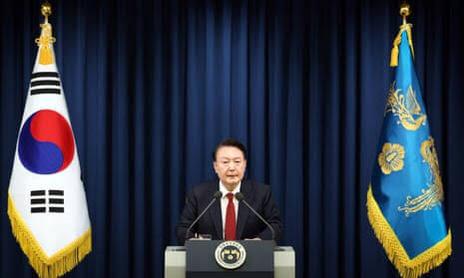
South Korean President Declares Emergency Martial Law
In a shocking and unprecedented move, South Korean President Kim Ji-hoon declared emergency martial law late on Tuesday night during an unscheduled television broadcast. The decree, which effectively transfers civil authority to military control, allows for sweeping powers such as warrantless arrests, media control, and the suspension of political activities. The announcement made at 10:30 p.m. local time on Tuesday, 3 December 2024, has plunged the nation into political and social uncertainty, raising serious concerns about the future of democracy in South Korea.
Martial law is a measure used during times of extreme national crisis, such as war, rebellion, or public disorder. It grants the military temporary authority over civil governance. In this context, President Kim justified his decision by alleging that elements within the government were sympathetic to North Korea and communist forces. This marks the first use of martial law in South Korea since the military dictatorship of the 1980s, a period marked by authoritarian rule and the suppression of civil liberties.
Martial Law and the President’s Justification
The president defended his decision by citing concerns over what he described as “elements of government sympathetic to North Korea and communist forces.” These remarks, broadcast during his unannounced address, evoked memories of South Korea’s turbulent history under military rule.
Sources suggest that the president’s frustration stems from a series of opposition-led initiatives in parliament, including the impeachment of multiple cabinet members, the prosecutor general, and a significant reduction of nearly $4 billion in the government’s annual budget. The president accused opposition forces of undermining his administration and claimed leftist elements had infiltrated critical areas of governance, creating a pretext for the declaration.
Kenneth Choi, the international editor of *The Chosun Ilbo*, commented on the perplexing nature of the decision: “While the president may feel frustrated by the opposition’s actions, the leap to martial law is shocking. The timing, rationale, and lack of preparedness have left the nation in confusion.”
Immediate Impacts on Governance and Civil Society
Under martial law, sweeping powers are granted to military and law enforcement bodies, enabling them to detain individuals without warrants, restrict political activity, and control media operations. Reuters reports that all media outlets in South Korea are now operating under the directives of the Martial Law Command, raising concerns about press freedom and access to information.
Opposition lawmakers, who form a significant majority in parliament, swiftly denounced the president’s actions as illegal. Many gathered at the National Assembly late into the night to strategise their response. However, early reports suggest that parliamentary activities have also been declared unlawful under martial law provisions, potentially paralysing legislative opposition.
“The essence of our democracy has come to a halt,” Choi stated. “This is a moment of unprecedented uncertainty, with many questioning the legality and necessity of such an extreme measure.”
A Nation in Disarray
Scenes of confusion and apprehension unfolded across South Korea following the announcement. In Seoul, citizens rushed to their families’ homes, seeking reassurance amid fears of escalating unrest. Police officers, reportedly unsure of how to implement the new directives, were observed making frantic calls to superiors for clarification. Despite the declaration, no significant military mobilisation or enforcement actions were evident in the immediate hours after the broadcast.
Choi highlighted the disorganised nature of the president’s approach: “The streets remain largely unaffected, with traffic flowing normally. There has been no visible movement from the military or police. It appears the declaration is more symbolic than operational—for now.”
Legal and Political Repercussions
Under South Korean law, the president’s declaration of martial law can be overridden by a simple majority vote in parliament. However, with martial law in effect, questions arise over whether parliamentary sessions can proceed unhindered. Legal scholars argue that such a vote if obstructed by martial law provisions, would set a dangerous precedent for the erosion of democratic norms.
The opposition leader condemned the declaration as unconstitutional, stating, “This is an illegal attempt to consolidate power and must be overturned immediately.” Analysts note that if parliament succeeds in rescinding martial law, the president’s adherence to their decision will be critical in determining the survival of the rule of law in the country.
International Reactions and Implications
The international community has closely monitored the unfolding crisis, with many expressing concerns about the impact on South Korea’s democratic reputation. As a key ally of the United States and a major player in the global economy, South Korea’s stability is vital for regional and international interests.
A senior official from Amnesty International called for an immediate review of the martial law decree, stating, “The use of martial law to suppress democratic institutions and fundamental freedoms is deeply troubling and warrants urgent action by international actors.”
Context: South Korea’s Historical Struggles with Martial Law
Martial law carries a heavy historical burden in South Korea. The country endured decades of authoritarian rule during the 20th century, marked by military coups and brutal crackdowns on dissent. The 1980 Gwangju Uprising, a pivotal moment in the nation’s democratic struggle, saw hundreds killed when martial law forces suppressed pro-democracy protests.
The declaration of martial law today has evoked memories of that era, with citizens questioning the return to such drastic measures. While South Korea has since emerged as a beaconi of democracy and economic development, the events of this week risk eroding decades of progress.
Unanswered Questions and Next Steps
As the situation develops, critical questions remain unanswered. Why did the president opt for a late-night announcement, and was this decision strategically timed to limit immediate opposition? How will law enforcement inand the military respond to directives under martial law, and what will be the broader societal implications if these measures are enforced?
In the coming days, the focus will shift to the opposition’s ability to challenge the decree legally and parliament’s capacity to convene under restrictive conditions. International pressure may also significantly shape the outcome.
Conclusion
South Korea stands at a crossroads as it faces one of the gravest challenges to its democratic institutions in decades. The president’s decision to impose martial law has plunged the nation into uncertainty, with potential consequences for governance, civil liberties, and international relations. Citizens, lawmakers, and the global community alike will be watching closely as the situation unfolds, hoping for a resolution that safeguards the principles of democracy and the rule of law.
This episode serves as a stark reminder of the fragility of democratic systems, even in nations with long-standing traditions of freedom and governance. The coming weeks will determine whether South Korea can emerge from this crisis with its democratic ideals intact or mark a troubling regression in its political evolution.
Aric Jabari is a Fellow, and the Editorial Director at the Sixteenth Council.



